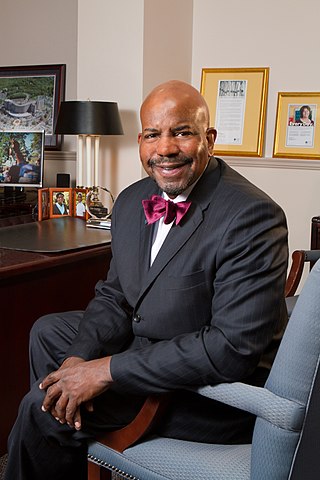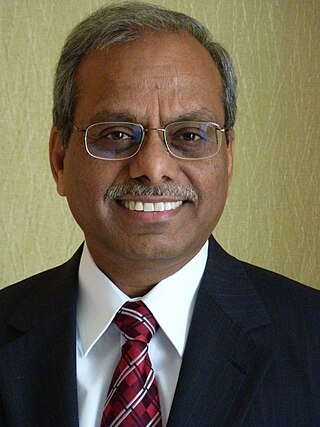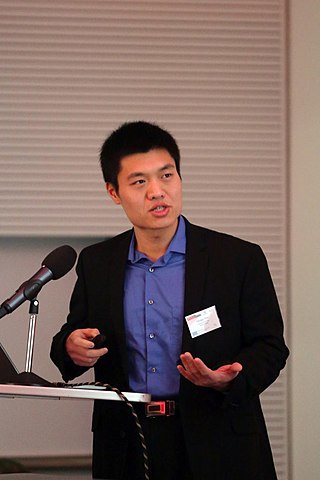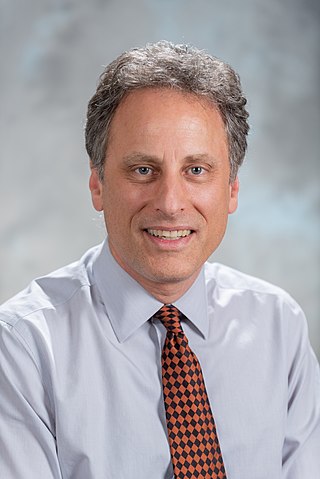The American Institute of Chemical Engineers (AIChE) is a professional organization for chemical engineers. AIChE was established in 1908 to distinguish chemical engineers as professionals independent of chemists and mechanical engineers.
The College of Engineering at the Georgia Institute of Technology provides formal education and research in more than 10 fields of engineering, including aerospace, chemical, civil engineering, electrical engineering, industrial, mechanical, materials engineering, biomedical, and biomolecular engineering, plus polymer, textile, and fiber engineering. The College of Engineering is the oldest and largest college of the institution.

Cato T. Laurencin FREng SLMH is an American engineer, physician, scientist, innovator and a University Professor of the University of Connecticut.

Rakesh Agrawal is a chemical engineer known for contributions to separations, cryogenic gas separation and liquefaction, and for contributions to renewable energy including the conversion of biomass to chemicals and fuels, inorganic solar cell fabrication, and the synergistic use of solar energy. He is the Winthrop E. Stone Distinguished Professor of Chemical Engineering at Purdue University in West Lafayette, Indiana.
Christopher W. Jones is an American chemical engineer and researcher on catalysis and carbon dioxide capture. In 2022 he is the John Brock III School Chair and Professor of Chemical & Biomolecular Engineering and adjunct professor of chemistry and biochemistry at the Georgia Institute of Technology, in Atlanta, Georgia. Previously he served as associate vice president for research at Georgia Tech (2013-2019), including a stint as interim executive vice-president for research in 2018.

Juan J. de Pablo is a chemical engineer, Liew Family professor in the Pritzker School of Molecular Engineering at the University of Chicago and senior scientist at Argonne National Laboratory. In 2018, he was appointed Vice President for National Laboratories at the University of Chicago, a title which later expanded to include Science Strategy, Innovation and Global Initiatives in 2020. As of 2021, he is Executive Vice President for Science, Innovation, National Laboratories and Global Initiatives at the University of Chicago. He is known for his research on the thermophysical properties of soft materials. He is currently the co-director of the NIST supported Center for Hierarchical Materials Design (CHIMaD). and former director of the UW-Madison Materials Research Science and Engineering Center (MRSEC). He was elected a member of the National Academy of Sciences in 2022.

Ruth Misener is a professor at the Department of Computing, Imperial College London. Her research concentrates on the development of software and optimisation algorithms for energy efficient engineering and biomedical systems.

Natalie Stingelin, Fellow of the Materials Research Society and Royal Society of Chemistry, is a materials scientist and current chair of the School of Materials Science and Engineering at the Georgia Institute of Technology, the University of Bordeaux and Imperial College. She led the European Commission Marie Curie INFORM network and is Editor-in-Chief of the Journal of Materials Chemistry C and Materials Advances.
Carol Klein Hall is an American chemical engineer, the Camille Dreyfus Distinguished University Professor of Chemical and Biomolecular Engineering at North Carolina State University. Her research involves biomolecule simulation, self-assembly of soft materials, and the design of synthetic peptides.

Krista Shereé Walton is an American chemical engineer. She is the Robert "Bud" Moeller Faculty Fellow and professor of chemical and biomolecular engineering and the Associate Vice President for research operations and infrastructure at the Georgia Institute of Technology.

Fengqi You is a professor and holds the Roxanne E. and Michael J. Zak Chair at Cornell University in the United States. His research focuses on systems engineering and data science. According to Google Scholar, his h-index is 80.

Gilda A. Barabino is the president of the Olin College of Engineering, where she is also a professor of biomedical and chemical engineering. Previously, she served as the dean of The Grove School of Engineering at the City College of New York, and as a professor in the Departments of Biomedical Engineering and Chemical Engineering and the CUNY School of Medicine. On March 4, 2021, she became the President-Elect of the American Association for the Advancement of Science.
Arthi Jayaraman is an Indian-American scientist who is the Centennial Term Professor for Excellence in Research and Education at the University of Delaware. Her research considers the development of computational models to better understand polymer nanocomposites and biomaterials. Jayaraman was elected Fellow of the American Physical Society in 2020.
Christine Sharon Grant is an American chemical engineer who is the Associate Dean of Faculty Advancement at North Carolina State University. Her research considers surface and environmental science. She is the 2022 President of the American Institute of Chemical Engineers.
Linda Jean Broadbelt is an American chemical engineer who is the Sarah Rebecca Roland Professor and associate dean for research of the McCormick School of Engineering and Applied Science at Northwestern University. Her research considers kinetics modeling, polymerization and catalysis.
Surita Bhatia is an American chemist who is professor and vice provost of faculty affairs at Stony Brook University. Her work considers the structure of soft materials, including polymeric hydrogels and colloidal glasses. She was elected Fellow of the American Institute of Chemical Engineers, the American Institute for Medical and Biological Engineering and the Society of Rheology in 2020.
Barbara Dale Boyan is the Alice T. and William H. Goodwin, Jr. Dean, College of Engineering at Virginia Commonwealth University College of Engineering.

Mark Robert Prausnitz is an American chemical engineer, currently Regents’ Professor and J. Erskine Love, Jr. Chair in Chemical & Biomolecular Engineering at the Georgia Institute of Technology. He also serves as adjunct professor of biomedical engineering at Emory University and Adjunct Professor of Chemical & Biomolecular Engineering at the Korea Advanced Institute of Science and Technology. He is known for pioneering microneedle technology for minimally invasive drug and vaccine administration, which has found applications in transdermal, ocular, oral, and sustained release delivery systems.
Deborah E. Leckband is an American chemist who is the Reid T. Milner Professor of Chemical Sciences and professor of chemistry at the University of Illinois Urbana-Champaign. She works on biomaterials, tissue engineering and the nano mechanics of biomolecules. She is a Fellow of the American Institute for Medical and Biological Engineering, the American Association for the Advancement of Science, the Biomedical Engineering Society and the American Chemical Society.
Julie Anne Champion is a professor of chemistry who holds the William R. McLain Endowed Term Professorship at Georgia Institute of Technology. She is known for her work on biomaterials used for drug delivery.








